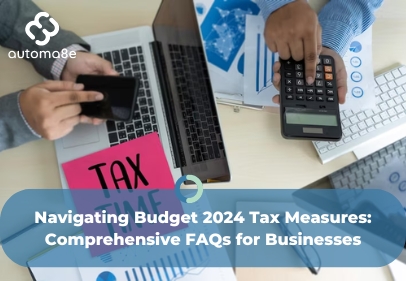As businesses gear up for the implementation of Budget 2024, there are key tax measures introduced that demand a closer look. To assist businesses in understanding and adapting to these changes, we’ve compiled a detailed set of frequently asked questions (FAQs) covering various aspects of the tax reforms.
1. Corporate Income Tax (“CIT”) Rebate for YA 2024:
A significant 50% CIT Rebate of the tax payable is set to be granted for the Year of Assessment (YA) 2024.
Companies that have actively contributed to the local workforce by employing at least one local employee in 2023 are eligible. They will receive a minimum benefit of $2,000 in the form of a cash payout.
The maximum cumulative benefits, combining CIT Rebate and CIT Rebate Cash Grant, are capped at $40,000.
2. Refundable Investment Credit (“RIC”):
RIC supports up to 50% of qualifying expenditures in high-value economic activities, extending this support for a considerable duration of up to 10 years.
Qualifying expenditures cover a spectrum, including capital expenditure, manpower costs, intangible asset costs, freight, and logistics costs.
The earned credits are strategically offset against CIT payable, and any remaining unutilized credits will be refunded as cash within a four-year timeframe.
Companies interested in availing RIC benefits can submit applications on a case-by-case basis. Further details on the application process will be provided by Economic Development Board (EDB) and EnterpriseSG by the third quarter of 2024.
3. Income Inclusion Rule (“IIR”) and Domestic Top-up Tax (“DTT”):
The Income Inclusion Rule (IIR) and Domestic Top-up Tax (DTT) are slated for implementation from financial years starting on or after 1 January 2025.
The IIR and DTT apply to relevant Multinational Enterprise (MNE) groups with an annual group revenue of 750 million Euros or more in at least two of the four preceding financial years.
IIR impacts in-scope MNE groups parented in Singapore, focusing on profits generated by their group entities operating outside Singapore. On the other hand, DTT applies to in-scope MNE groups concerning the profits of their group entities operating within Singapore.
4. Undertaxed Profits Rule (“UTPR”):
The consideration of the Undertaxed Profits Rule (UTPR) is deferred to a later stage.
5. Concessionary Tax Rate Tiers:
An additional 10% tier is introduced for Finance and Treasury Centre (FTC) and Aircraft Leasing Scheme (ALS) incentives. Additionally, a 15% tier is implemented for Development and Expansion Incentive (DEI), Intellectual Property Development Incentive (IDI), and Global Trader Programme (GTP) incentives.
These changes will come into effect for the relevant incentives.
6. Tax Deduction for Renovation or Refurbishment (“R&R”) Expenditure:
Significant enhancements include expanding the scope of qualifying expenditure to encompass designer fees or professional fees.
A fixed three-year period is established for computing the R&R expenditure cap.
An option is introduced to claim R&R deductions in one YA, subject to the prevailing expenditure cap.
Further details on these enhancements will be furnished by the Inland Revenue Authority of Singapore (IRAS) by the third quarter of 2024.
7. Extension and Revision of Tax Incentive Schemes for Qualifying Funds:
Schemes due to lapse on 31 December 2024 will undergo an extension, stretching till 31 December 2029.
The Section 13O scheme is enriched to include limited partnerships registered in Singapore.
Economic criteria for Qualifying Funds under sections 13D, 13O, and 13U schemes will be revised.
The Monetary Authority of Singapore (MAS) commits to providing additional details by the third quarter of 2024.
Understanding these FAQs is crucial for businesses to navigate the intricacies of Budget 2024 tax measures and ensure effective compliance and strategic planning.
